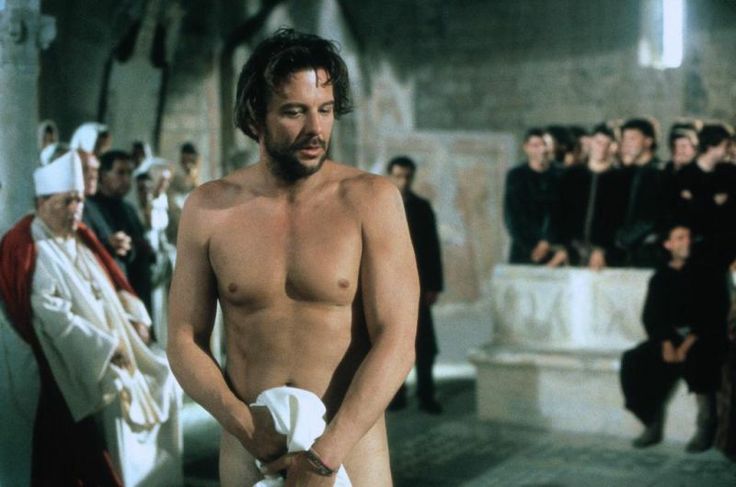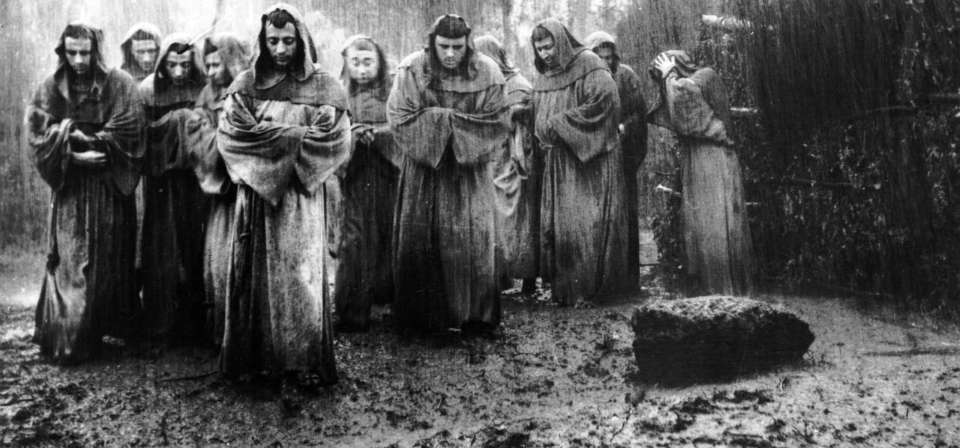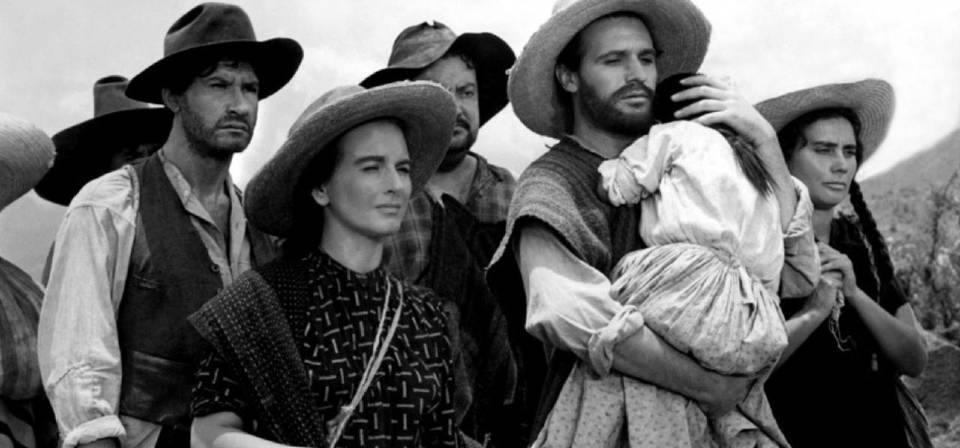Reviews

Francesco (1989)
How is it, then, that Cavani succeeds in making Francesco neither an attractive hero of secular virtues nor an off-putting champion of spiritual ones? How does she come to make her protagonist off-putting without being otherworldly, earthbound without being attractive?
The Aviator (2004)
You can almost feel Martin Scorsese exorcising the specter of Gangs of New York in the first act of The Aviator, another leisurely two-hour, forty-five-minute exercise in lavish period Americana starring Leonardo DiCaprio.
Ordet (1955)
Ordet means "the word," but what is the word? What is Carl Dreyer’s somber, ponderous masterpiece, adapted from the stage play by Lutheran clergyman Kaj Munk, really about?
Chariots of Fire (1981)
Two very different approaches to religion and sport are at the heart of Chariots of Fire, a period piece that explores timeless themes of temporal ambitions and higher purposes, of commitment and sacrifice, of ability and spirit.
In Good Company (2004)
It’s not without faults. At times the satire crosses over into silly farce, and, while the last act avoids the most obvious clichés, it’s still a bit tidy. And some of the film’s basic themes seem undermined by an unfortunate subplot involving perplexing decisions by more than one character. But if these faults can’t quite be overlooked, the film’s virtues are rare enough to make the whole package worthwhile.
Thérèse [The Story of Saint Thérèse of Lisieux] (2004)
“Ordinary girl. Extraordinary soul” is the tagline of Thérèse, Catholic actor-director Leonardo Defilippis’s reverent, uplifting, straightforward biopic of the Little Flower. Of the tagline’s two clauses, the film’s special burden seems to be the first part, “ordinary girl.”
The Forgotten (2004)

The Story of the Weeping Camel (2003)
None of these camel myths seems as curious, improbable, and magical as The Story of the Weeping Camel itself. Presented by National Geographic, the film relates the birth of a rare white camel calf among the herds of an extended family of four generations living under one roof in the wilderness, and of the camel calf’s struggle for survival after its mother, traumatized by the difficult labor, rejects it and refuses to allow it to suckle. How this family of herders deals with this small crisis is an unguessable miracle that will delight children and adults alike.
Au Revoir Les Enfants (1987)
Au Revoir Les Enfants, Louis Malle’s semi-autobiographical film about life in a Catholic boarding school for boys in Nazi-occupied France, has been called an elegy of innocence lost, though in fact the youthful characters are never truly innocent, only clueless, and what they lose is not innocence but something more elusive.
The Princess Bride (1987)
Rob Reiner’s great cult classic The Princess Bride is one of those rare satiric gems, like The Court Jester and Galaxy Quest, that doesn’t just send up a genre, but honors it at the same time, giving us the excitement and pleasure of the real thing as well as the laughs of a comedy.

The Flowers of St. Francis (1950)
Rossellini doesn’t cater to contemporary sensibilities by reinventing Francis as a mere eccentric free spirit, a medieval flower child, such as we find in Zefferelli’s Brother Sun, Sister Moon. Francis remains challenging to modern audiences here, his childlike spirit joined to insistence on strict religious obligation and ultimately to zeal for evangelization.

Nazarín (1959)
Buñuel makes his case against faith, not by attacking its foolish or corrupt practitioners, but by arguing that the thing itself, even when lived almost to perfection by a near saint, is moot, even harmful. It may be the most breathtaking cinematic cross-examination of faith I have ever seen.
Lemony Snicket’s A Series of Unfortunate Events (2004)
If you prefer movie reviews about pleasant and uplifting films in which goodness is suitably rewarded, evil is suitably punished, and children are not placed in excessive peril or disagreeable circumstances, you may wish to read some other review.
Flight of the Phoenix (2004)
This provocative comeuppance for can-do American spirit is thrown to the winds in the remake, which from the outset establishes pilot Frank Towns (Dennis Quaid) and his co-pilot A.J. (Tyrese Gibson in the Attenborough role) as bullying, swaggering creeps with no redeeming traits who exist in order to be taught a lesson. They’re gratuitously abusive to the ragtag team of abruptly unemployed oil-riggers they’ve come to evacuate. Their arrogant repartee in the opening minutes is so full of leering sexist humor (Frank’s the sort of guy who can’t even buckle his seat belt without making a lewd remark about it) that by the time A.J. observes of the massive sandstorm into which they’re flying, "That’s a big one, Frank," we can tell it must be serious, since Frank makes no crass response.
The Burmese Harp (1956)
Kon Ichikawa’s deeply humane, spiritually resonant masterpiece The Burmese Harp is routinely but reductionistically described as “pacifist” or “anti-war,” though in fact war is merely the occasion for the story’s theme, not the theme itself. That theme is nothing less than the intractable mystery of suffering and evil, an affirmation of spiritual values, and the challenge to live humanely in evil circumstances.
I Am David (2004)
Why has young David (Ben Tibber) spent most of his short life in a Bulgarian labor camp? He doesn’t know, and neither do we. As the title suggests, I Am David wants us to experience David’s story through the eyes of a young boy who has never known anything but this camp, except for a few flashbulb memories of a fair-haired woman he knew in another life.
Christmas with the Kranks (2004)
What on earth was anyone thinking? Luther’s so Kranky he can’t just skip the Christmas-Eve shindig… he wants a "total boycott," even of charitable donations — despite the fact that they’re saving money on the cruise over against their usual seasonal expenditures. (That his wife Nora, played by Jamie Lee Curtis, absolutely refuses to go along with his plans until Luther caves on the charitable donations is some consolation, but not nearly enough.)
National Treasure (2004)
Nicolas Cage stars as heir to a family of treasure hunters seeking the riches of King Solomon’s temple, discovered by the Crusaders and hidden by the Knights Templar and the Freemasons, who planted clues on the back of the Declaration of Independence.
The Fighting Temptations (2003)
Here is a film so woefully misconceived, so completely devoid of even generic, safely banal Hollywood spiritual uplift, that it made me long for the spiritual depth and religious meaning of Sister Act and Bruce Almighty.
The King of Kings (1927)
Cecil B. DeMille’s biblical silent masterpiece The King of Kings, until now available in home video only in DeMille’s shortened 112-minute 1928 cut, is now available in a new restored DVD edition from Criterion that includes both the original 155-minute 1927 “roadshow” version and the shorter general release version.
Recent
- Benoit Blanc goes to church: Mysteries and faith in Wake Up Dead Man
- Are there too many Jesus movies?
- Antidote to the digital revolution: Carlo Acutis: Roadmap to Reality
- “Not I, But God”: Interview with Carlo Acutis: Roadmap to Reality director Tim Moriarty
- Gunn’s Superman is silly and sincere, and that’s good. It could be smarter.
Home Video
Copyright © 2000– Steven D. Greydanus. All rights reserved.